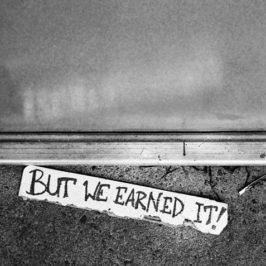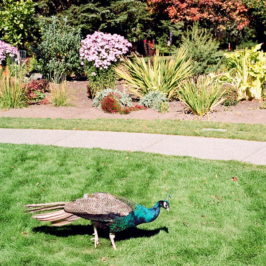 The Mission, at last, had been a success. From a vantage point thousands of light years away, the crew of the Transmemoria could observe scenes of life on Earth in the year 30 AD. They watched, holding their breath, as the man called Jesus of Nazareth was nailed to a cross. Rex gave a small cough to mask a sob that caught in his throat. Ellen was stationary at her lens, but shaking with emotion. So many years of planning, billions of dollars in funding, and the long, long journey here…
The Mission, at last, had been a success. From a vantage point thousands of light years away, the crew of the Transmemoria could observe scenes of life on Earth in the year 30 AD. They watched, holding their breath, as the man called Jesus of Nazareth was nailed to a cross. Rex gave a small cough to mask a sob that caught in his throat. Ellen was stationary at her lens, but shaking with emotion. So many years of planning, billions of dollars in funding, and the long, long journey here…
Jorge tried to let out a whoop, but only partially succeeded. Then he laughed at his attempt, and the rest of the crew laughed too, throwing arms around each other and crying.
“And now, the journey home!” said Dean, a grin cracking his thin lips.
“Shouldn’t we wait three days, though?” asked Ellen. “To see if he rises again?”
“Absolutely,” agreed Rex. “That part is crucial. We’ll divide up the watches.”
“All right, three days,” agreed Dean. “But man, I’m excited to set my own two feet back on Earth, instead of just watching it from up here.”
—
The following three days crawled by. After so many years on the spacecraft they were used to boredom, but it was more difficult to endure now that the prospect of their return was on the horizon. Albert and Dean were playing chess, but neither of them was paying attention.
“What are you looking forward to most, when we get home?” asked Ellen dreamily. “For me, it’s ice cream. I’m going to buy a pint of chocolate ice cream and just eat the whole thing real slow. The dehydrated ice cream sandwiches we have here are okay, but they’re not the real thing.”
“Grass, I think,” said Dean. “I want to walk barefoot in a park in the summer. Remember that feeling, of the ground squishing a bit between your toes? How the ground had a little give?” His feet bounced against the solid floor of the ship, remembering.
“Animals,” said Jorge, walking up behind them. “I used to have a dog, before we left—I mean, he’ll be long dead. But I’ll get another one, maybe. And birds. Remember sometimes, you’d wake up in the morning, and hear the birds outside?”
“And going to the beach, and feeling the salt water washing up and down your legs, with the waves?” murmured Albert.
They sat in silence, imagining birds, and waves, and grass, and ice cream.
“Man your lenses!” called Rex from the observatory window, and everyone hurried to obey.
The lenses had all been set to track the tomb. In the navy blue of very early morning on Earth, the massive outline of the stone seemed to be wobbling. It was hard to be sure. Rex switched on the thermographic sensors, and a faint pink outline undulated around the edges of the stone. Then the screens were flooded with a burst of bright yellow. He yelped and fumbled with the switches, turning it back to standard view, but nothing changed. With a fizzle of static, the video equipment cut out.
Rex swore, and started frantically rearranging cables and checking input feeds. He couldn’t find anything wrong with the setup, and went about rebooting the system. A full reboot would take twenty minutes, and every second that ticked by was an agony to him.
“But that was it, right?!” asked Ellen. “He rose! He was rising!”
“We can’t prove it, though!” snapped Rex from underneath a desk. “All we saw was a source of extreme heat. It could have been a fire, or an explosion.”
“Why don’t we head a bit further from Earth?” suggested Dean. “All we need is twenty minutes back; 350 million kilometres or so.”
“We don’t have that kind of range,” said Albert, checking his charts. “Takes us into the gravitational pull of S Monocerotis.”
They fell into silence, and gazed helplessly out the windows of the craft.
Once the optical equipment was back up and running, the following hours were filled with observation and documentation. Their accounts of the events observed were finalized, and preparations were made for departure.
Dean fired up the engines, and Albert directed the craft towards the first of three wormholes that would shorten their journey back to Earth. Even with these shortcuts through space-time, it would be nearly three years before the Transmemoria could dock back at its home port in Florida.
—
As the ship exited the final wormhole, the crew rushed to their observational area to catch a glimpse of their home planet. As they tried to focus their lenses, it became apparent that something was wrong.
A dense layer of dust and ash hung about 100m above sea level. As the ship approached the planet, the haze cleared to reveal a blackened, pockmarked surface. The stunned silence of the crew was broken by Rex, whose voice cracked as he doled out instructions.
“Set your coordinates to major cities. Scan for signs of life. Jorge, New York. Ellen, Mexico City. Dean, Mumbai. Albert, Tokyo.”
They obeyed, not knowing what else to do.
The cities listed were dark and silent. Buildings had begun to crumble. Trees were reduced to dust. There were no people anywhere, not even bodies.
“Wait, I think I’m picking something up,” said Dean after several minutes of shocked silence. “In…” he checked the coordinates, “Palestine.”
And there were people, after all. They formed a long, snaking line. And at the head of the line was a man they recognized.
“And he will come to judge the living and the dead,” quoted Ellen solemnly. Her eyes were very large.
“Should we land?” asked Albert.






